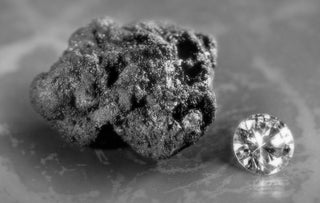In the hectic days of constant rushing around, the little sparkle of a diamond helps you pause for a second and forget about the worries of the world. Take that relaxing sigh for a split second as you behold its magic. A diamond’s sparkle can soften a heart and even if just for a short while, it makes you feel like you belong to a fairy tale world. But what makes diamonds so beloved? Take a brief trip through the history of diamonds.
An ancient love for diamonds
Did you ever wonder about the origins of this magnificent marvel? To learn more about its history, we have to go back as far as the 4th century BC. According to most theories, man first came across diamonds in the land of India. At first, diamonds were therefore only traded in India. But after Alexander the Great brought the first diamonds to Europe in 327 BC, the public and especially elite fell in love with the gem in no time.

From rough to polished
However, before the diamond gets its dazzling quality, it goes through a refinement process. The diamond’s journey starts in the deepest layers of rocks. Shaking and rumbling grounds, either by nature or manpower, forcefully eject the stones from their cradle. After being removed from its “bed”, the diamond goes through a lot of processes, like cutting and polishing. Only after these processes, the diamond comes in display at the jeweler’s store. Thus, after all the final touches, the once rough and jagged stone becomes a magical gem displaying brilliance and grace.
New diamond cuts
As diamonds gained mainstream popularity, new shapes and designs emerged. Around 1375, one of the very first designs appeared: the Point Cut. This design matched the natural contour of the diamond. The Point Cut’s predecessors were only naturally well-shaped diamonds. Diamonds that came in in rough and jagged form, were not attention worthy. After all, there were no cutting masters around to polish it into a particular shape.

New marketplaces
Sources of the diamond marketplace changed throughout the years. As mentioned before, it started in India. Then the trade and selling shifted to Europe. By the 18th century, people discovered diamonds in Brazil as well. So, even though the diamond was an exclusive piece in the past, it is now equally available throughout the world. The modern diamond trade started in Africa, where they discovered diamonds in 1866. Towards the beginning of the 20th-century, people discovered diamonds in the U.S. as well as Canada and other newly discovered places. Due to its value and high demand, mining for diamonds also shifted from surface to underground mining.
Eternal beauty
Needless to say, it was becoming more and more popular, especially among the elite. Women and as well as men enjoy this sparkling beauty, which seems to put a smile on everyone’s face. New knowledge about its different properties and ways of handling has also sprouted during this time, which led to creating pieces of perfection. To this day, the diamond remains the most valuable gem in the world and its splendor appears to shine through centuries.


 DOWNLOAD PDF
DOWNLOAD PDF